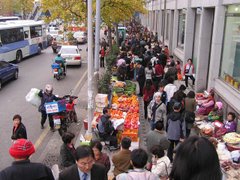The Busan Information Center may be commended with its model of uniform curriculum and centralized development of lesson materials. I find the development of lessons in forms of video clips to be very effective in several ways. Video clips come very handy because it’s CD based, and consumes short time that allows students to enjoy what is viewed while absorb what is being conveyed in the video. Both teachers and students can easily review the lesson again and again. The language used is in the vernacular which makes it highly understandable.

The Center of Teaching and Learning is an ideal institute. It is able to support teachers and students with interests to improve their learning abilities.

Some Interesting Instructional Techniques
While a lot of teaching strategies and methods were discussed, there were some techniques that caught my attention. Aside from e-mail and chat, the use of videoke to learn a second language is very effective.
Student exhibits and competitions harness the best among the students. Competitions are very common in all the schools. Competitions get the best not only from the students but even from the teachers who coach the students.
Online and/or computerized exams push students to prepare and study well for exams.
The Kimchi Wrap Concept
The kimchi
[3] is a staple healthy food in Korea. The kimchi comes in different varieties using different vegetables like raddish, cucumber, turnip and others. The kimchi is commonly served with a bunch of other side dishes, sometimes with bean curd and other vegetables.
What is interesting that most Korean food websites do no tell is the special way of eating kimchi. That is, you get a vegetable leaf, put the kimchi on top, wrap it, and eat it like you place butter inside a dinner roll. Personally, I call this as the kimchi wrap concept. You can replace or mix the kimchi with meat or another side dish suited to your taste, put it on the leaf, and enjoyably eat it.
This is how e-learning is fused in the Korean educational system, it is the same as the Kimchi wrap. While the base food will be kimchi, there will be over a dozen of different ways to eat or relish the kimchi. Education has a high premium in Korea and there are various methods and ways, as well as ICT tools to use to improve teaching and learning.
Not all cities or schools will have excessive funding but the government ensures the schools have uniform curriculum and lesson materials to be used. The structure allows different methods of eliciting creativity and versatility in teaching while students find learning in and outside the school as an inevitable fun and work. And the teachers are empowered, exhibits a lot of confidence.
Conclusion
While my stay in Korea had only been two weeks in November of 2006, the wisdom of the kimchi wrap extends to how the Filipinos can pick up from the Korean practices.
1. The Filipino educational system may want to follow the model of uniform curriculum and lesson materials. The development of video clips can be adopted. Lessons in video are cost-effective and simple to develop than having a courseware made in Flash or a presentation made in Powerpoint. DVD or CD players and televisions are very affordable equipment and are present in leading public schools in the Philippines.
Language used should be in Filipino and not in English. The use of the vernacular language allows students to compose ideas freely and express them without reservations or any form of translation handicap.
2. The Alcob community is a model that the Philippines can also adopt. A Filipino teachers’ community can be a good way to empower teachers across the archipelago and share all their innovative ideas in teaching.
The De La Salle University of the Philippines, the College of Computer Studies as a Center of Excellence in IT, can initiate the formation of an Online Filipino Teachers’ Community that will have the goal of empowering teachers from both the privileged and underprivileged places of the country.
3. While the Filipino local teachers are very dedicated and committed to imparting knowledge to their students, I think the idea of competitions can bring the best out of the students. Both private and public schools should engage in various competitions, inside and outside their own schools. Competition promotes independence, camaraderie, creativity and excellence among students and mentors.
Finally, the vision of shared prosperity of the Apec e-Learning is starting to be realized. It is not only having the chance of having a bird’s eye view of some of the best e-Learning practices of Korea but learning the wisdom from these practices. And as for the kimchi, jal muk ut sup ni da – that was very good.□
[1] The most recent education policy is stated in the National Education Information System 2004. It comprises a timeline of 10 years.
[2] The use of ICT in teaching resulted to very good performance of students in problem-solving, math and reading in high achievement tests conducted in Korea.
[3] The kimchi typically uses soaked, fermented or pickled cabbage with red, ground chili powder and ginger.















